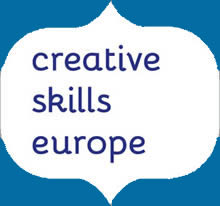



Professional training – initial and ongoing – because of its impact on the development of the cultural and creative sectors, on employment opportunities, and on individual careers - sits at the heart of the preoccupations of social dialogue.
Both employers’ and workers’ organisations have a vested interest in seeing professionals in the sector acquire the right set of skills at the right time in the course of their work lives.
As the audiovisual and live performance sectors are impacted by globalisation and digitisation, affecting almost all the occupations that compose their workforce, skills development has become a necessity for all types of businesses and organisations.
Access to training is also a key condition for securing individual careers that may know project-based engagements, outside of traditional employment relationships (self-employment, freelancing, etc.).
As the sector is going through transformations, professionals need a capacity to ‘reinvent themselves’, to move from one occupation to another or to broaden their skills portfolio to adapt to new realities and/or roles, or to earn a living when one occupation is not enough.
As a large proportion of professionals in the cultural and creative sectors tend to change employer numerous times in the course of a career, skills solutions have to be discussed at individual level, at company level and at sector level.
Across the European Union, employers and unions have been given a strategic role in piloting and/or implementing professional training schemes.
Social partners are in general closely associated with vocational education programmes and are key stakeholders when promoting and developing apprenticeships.
In a more limited number of countries, sector-specific bodies (skills councils, training funds, observatories, etc.) have been created. They monitor the developments of the sector, establish ongoing discussions between key stakeholders, and initiate skills solutions that respond to the sector’s needs.
They are also privileged meeting places between the industry and education institutions, and important sources of information for the broader public on career perspectives in the creative and cultural industries.
Funded by levies, employers’ contributions, training providers and/or public funding, of different sizes and with different aims, depending on the national context, there are very interesting models of sector-level engagement in employment and training discussions and actions.
In France the system of professional training is rooted in a legislation adopted in the 1970s. The latest reform, put in motion by the adoption of the ‘law for the freedom to choose one’s professional future’ in September 2018, is currently being rolled out. It will bring major changes to the institutional landscape, as well as to the funding mechanisms and their accessibility.
Nearly 32 billion euros are dedicated each year to professional training in France. One of the sources of funding (14,3 billion) comes from a compulsory contribution from the employers (0,55% of the total payroll for companies of less than 11 employees and 1% of the total payroll for bigger companies) and from an apprenticeship tax (0,68% of the total payroll for companies subject to it). In the new system both contributions will be merged into a unique contribution centrally collected by URSS AF (that already collects social security contributions) before being redistributed to a newly created cross-sectoral body (France Compétences) and then to ‘Operators of competences’ covering each a number of economic sectors.
On top of those compulsory legal contributions, companies also contribute on a voluntary basis with the aim of completing their training plans established each year in line with their needs. They then transfer their contribution to their ‘Operator of competences’.
The sector social partners can also conclude agreements that foresee conventional contributions. The objective there is to build shared training plans and to respond to training priorities they will have identified. The State and the Regions also contribute to the funding of professional training.
For the cultural and creative sectors, the sectoral body will continue to be, after the reform, AFDAS (with an enlarged portfolio). AFDAS, piloted by the social partners, has been managing the sector’s training rights and schemes for decades. It has been key in promoting the transversal schemes towards the sector, as well as in developing sector-specific tools. The future of some of those tools is still uncertain but the offer of services and of guidance to businesses and professionals will be maintained. Under the new law, the role of social partners in the apprenticeship system will be reinforced.
On a more political front the CPNEF SV and AV (National Joint Committees on Employment and Training for, respectively, the Live Performance and Audiovisual sectors) are in charge of the identification of employment needs and of the evolution of competences, in order to propose solutions and to adapt the offer of initial and continuous training. To achieve those missions, they publish guides to the sectors’ occupations, statistical dashboards, prospective studies, etc.
At company-level, organisations of 300 employees or more, have the obligation to engage, at least once every 3 years, in negotiations with unions on the Forward Planning of Employment and Skills (Gestion Prévisionnelle des Emplois et des Compétences - GPEC). The obligation is to negotiate, but not necessarily to reach an agreement. Companies of less than 300 employees can, of course, engage in such negotiations as well, if they wish too.
The objective of a GPEC agreement is to anticipate the socio-economic, technological or organisational evolutions of the company and to adapt the competences of its employees to face those changes. The French public broadcaster, France Télévisions, for example, negotiated and adopted a GPEC agreement. The document presents a cartography of the permanent occupations within the company, a projection of the expected transformations during the period 2017-2020, and then puts forward a strategy to accompany those transformations.
To know more:
https://www.afdas.com/
https://www.cpnefsv.org/
http://www.cpnef-av.fr/
In Belgium collective agreements in the live performance, audiovisual and film production sectors foresee the collection of employers’ contributions (0,10% of the total payroll) for the employment and training of ‘groups at risk’. Those ‘groups at risk’ are defined broadly and include professionals whose jobs are changing or are impacted by technology, young job seekers, older workers, etc..
Those contributions are managed and redistributed by mediarte.be for the audiovisual and film production sectors in Belgium and by Sociaal Fonds Podiumkunsten for the performing arts and music sector in the Flemish Community. Both organisations are governed by social partners.
In addition to delivering and funding training actions, mediarte.be and Sociaal Fonds Podiumkunsten developed a portfolio of activities (career coaching, on safety and well-being, on diversity, etc.) funded by general schemes, or through specific agreements with public institutions.
To know more:
https://podiumkunsten.be
https://www.mediarte.be
In the UK, two organisations focus on the skills needs of the cultural and creative sectors: Creative & Cultural Skills (craft, cultural heritage, design, literature, music, performing arts and visual arts) and ScreenSkills (animation, film, games, television, VFX and immersive technology). Both organisations work closely with employers, trade unions and other stakeholders.
Creative & Cultural Skills gives opportunities to work and learn in the creative industries. An independent charity, it provides careers advice and guidance, promotes apprenticeships, and delivers activities for young people through its National Skills Academy network of industry and education supporters. Since 2008, Creative & Cultural Skills have created over 7,000 Creative Apprenticeships and provided over 5 million people with careers advice.
ScreenSkills provides insight, career development and other opportunities to help grow and sustain the skilled and inclusive workforce of the screen sector.
Its work includes:
In addition to support from voluntary industry contributions, it is supported by the BFI awarding National Lottery funds to deliver the BFI’s Future Film Skills programme. ScreenSkills also receives funding from Arts Council England to share expertise and best practice from screen to other parts of the creative industries.
Initiatives such as the Theatre Workforce Review and the Workforce Development Strategy of UK Theatre and the Society of London Theatre, or the Digital Learning Centre for Creative Freelances of the Federation of Entertainment Unions are other good examples of the role and impact employers’ and workers’ organisations can have in the field of skills needs assessments and professional training.
To know more:
https://ccskills.org.uk/
https://www.screenskills.com/
https://uktheatre.org/
https://www.feutraining.org/
Because of their connection to the field, of their insight into the key trends affecting the sector, and of their capacity to implement and promote skills solutions, employers and workers’ organisations are engaged across Europe in professional training actions.
They are asked to feed into initial education curricula, and to be active stakeholders of vocational education programmes. They are invited to take an active role in the development of apprenticeships or traineeships, and to offer opportunities for continuous training to their staff.
In some countries, such as France, the role of social partners in skills development and lifelong learning is regulated by a general law that is complemented by agreements negotiated at sector-level.
In other countries, such as Belgium, collective agreements foresee the funding of ongoing training actions through employers’ contributions that are then managed and redistributed by skills bodies piloted by social partners.
In the UK, employers from the audiovisual sector contribute to Skills Funds - agreed upon by the industry voluntarily or negotiated at the time of the introduction of a tax relief.
Across the European Union apprenticeship systems are characterised by the involvement of social partners in their governance and implementation.
Outside of formal agreements initiatives developed by employers’ and workers’ organisations, jointly or separately, to respond to short-term needs can also lead to great impact and be interesting testing grounds for further actions.
At local level, in particular, partnerships are key to establish synergies and mutualise resources.
Co-operation between employers’ and workers’ organisations can also lead to a better take up of the training offer, to more relevant training actions, and to initiatives that takes into account both the needs of the company and of the individual careers.
Discussions between management and workers at company-level on skills development are finally very important to be maintained to make sure:
Such discussions can take place in a more or less formal environment but, whatever format is chosen, co-operations between management and unions will be an essential element to further ingrain training in the audiovisual and live performance sectors, and to offer training opportunities that are both relevant and accessible to professionals in those sectors.
 Publication prepared in 2019 in the context of a project which received support from the European Commission. This publication reflects the views of the authors only and the Commission cannot be held responsible for any use which may be made of the information contained therein.
Publication prepared in 2019 in the context of a project which received support from the European Commission. This publication reflects the views of the authors only and the Commission cannot be held responsible for any use which may be made of the information contained therein.